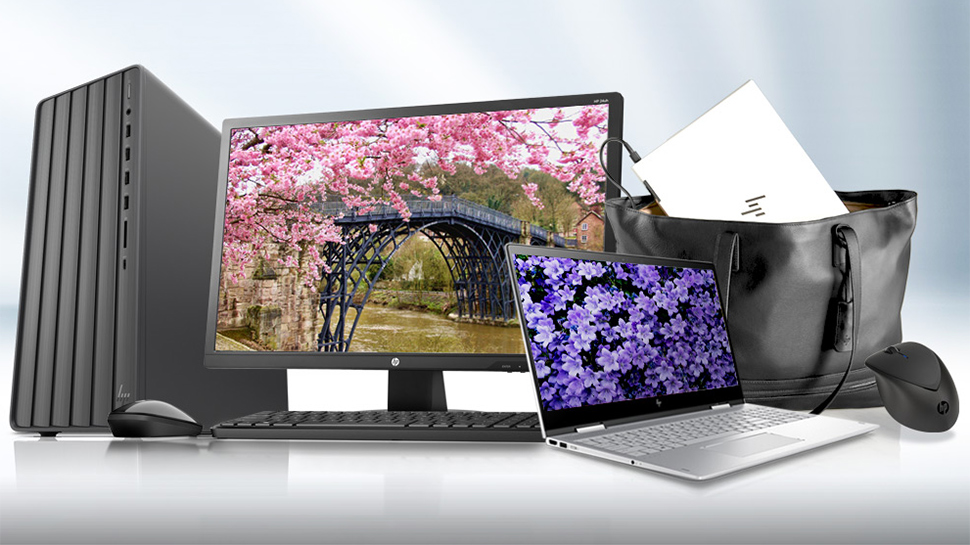PC Sales Hurt by Chip Deficit: Dell Enjoys Gains, HP Suffers
As demand for PCs remains strong, leading PC makers Dell and HP post strong financial results and report growing PC sales. But persistent shortages of components hurt HP badly in the second quarter: it admitted this week that it could not meet all PC orders in Q2 due to supply constraints. Interestingly, HP says that while AMD and Intel supplied enough CPUs, makers of cheap components cannot supply enough units. Meanwhile, Dell, which makes some of the best gaming laptops and best gaming PCs thanks to its popular Alienware brand, increased PC shipments and gained some share in Q2 2021.
Shipments of PCs in Q2 2021 totaled 83,614 million units, up 13.2% year-over-year, but a slight (0.44%) decrease from Q1 2021, according to IDC. Analysts believed that strong sales in the first quarter were driven primarily by unfulfilled demand from 2020 that had carried forward. Traditionally, the second quarter is significantly better compared to the previous quarter in terms of PC unit sales, but this was not the case in Q2 2021. The whole industry could only produce about the same number of personal computers as in the first quarter.
HP Struggles to Meet Demand
The CEO of HP admitted in an interview with Bloomberg that the company got enough CPUs from AMD and Intel, but the problem is that many small and inexpensive chips that are used widely in the industry are in short supply, which constrained the company's shipments. In fact, the company has tens of millions of PCs in the backlog because of persistent deficit of these components.
"We continue to ship as many products as we can while navigating a complex operational environment," Enrique Lores, chief executive of HP, told financial analysts and investors on the company's earnings call (via SeekingAlpha) this week. "When I say the backlog is close to one full quarter, this gives you the magnitude of the orders that we have not been able to fulfill."
Interestingly, the two largest PC vendors — Lenovo and HP — saw their unit shipments decline, which in the context of shortages does not look good. Lenovo remained the No. 1 PC maker with 20.005 million PCs and a 23.9% market share, but is sales dropped by 395 thousand units, according to IDC. HP came in second with 18.594 million computers (down 643 thousand units from Q1) and a 22.2% share.
It is noteworthy that Lenovo and HP have significantly different business models. Lenovo relies on its own manufacturing facilities as well as outsourcing to original design manufacturers (ODMs). Since it has its own PC production, it completely controls its supply chains and has some additional flexibility and understanding when it comes to procurement of components. By contrast, HP outsources virtually all of its PC production to ODMs and while it has been aggressively stockpiling components, it did not really help to sustain shipments and share in Q1. In addition, HP faced other disruptions like factory lockdowns and issues with logistics.
"On the PC side […] we clearly have some areas where we need to improve operationally to be able to optimize our performance given the delta between supply and demand," said Lores.
Get Tom's Hardware's best news and in-depth reviews, straight to your inbox.
The head of HP said the company had three methods to get more components and balance supply and demand.
"[Firstly], the majority of our production is managed by ODMs, this means that those ODMs were managing […]relationship with the providers of the components that we are missing," said Lores. "We have been thinking that signing now direct relationship and direct supply agreements with them [to address that gap]. Second, […] you will see an increase of leverage of components across multiple products so we can really optimize our digitalization of components. Third, [our new] enterprise resource planning (ERP) system [enables us] to […] optimize the allocation of orders, not only based on business priorities, but also on component availability. […] Until now, […] we had to do it manually."
Dell Eats HP's and Lenovo's Lunch
Looks like Dell ate Lenovo's and HP's lunch in the second quarter. While Dell was the distant third with 13.976 million systems and a 16.7% share, its shipments increased by 1.03 million, according to IDC. The company admits that the environment is extremely challenging, so it had to work hard to gain unit shipments and share.

"The industry demand […] for semiconductors continues to be strong," said Jeffrey W. Clarke, co-COO of Dell. "That is the area that is challenged certainly for us. […] The execution of our supply chain team is quite impressive with record shipments for the quarter for PCs, record shipments for displays."
Just like its rival, Dell says that the biggest problem is to get enough small components that are used not only in PCs, but in tens of millions of other devices.
"But the types of devices [in short supply] would be scalers, TCONs, microcontrollers, power ICs, driver ICs," said Clarke. "Those types of devices are the ones that we see consistently challenged at different times."
Dell admitted that while it gained share and increased shipments in the second quarter, it also could not fulfill all of its orders and its backlog grew.
"The growth was driven by an expanded backlog given that demand is ahead of supply in addition to solid performance in hardware and software maintenance," said Thomas W. Sweet, CFO of Dell.

Anton Shilov is a contributing writer at Tom’s Hardware. Over the past couple of decades, he has covered everything from CPUs and GPUs to supercomputers and from modern process technologies and latest fab tools to high-tech industry trends.
-
ingtar33 Meanwhile, Dell, which makes some of the best gaming laptops and best gaming PCs thanks to its popular Alienware brand...Reply
you know the line blurs between ads and news when you can't tell which is which. is this a paid ad or a news article? I don't know. and that's a problem for this site when i can't tell the difference between it's content
JUST BUY IT! -THG -
Heat_Fan89 Dell actually makes some of the best if not the most innovative gaming laptops sold with the Alienware badge. They really are cutting edge and have been for at least the last 10 years. However, their desktops are a joke. I should know as I own an Aurora R10.Reply -
LolaGT Anyone in the know would sing out loudly to stay far away from Dell home PCs in general, and they tanked the Alienware brand for desktop gaming as soon as they acquired it(not that it was super before then).Reply -
Joseph_138 What's not being said, is that a lot of the sales that they are making, are basically video card sales, and not computer sales. People are buying these machines for their video cards, and reselling the rest on ebay. That also hurts new PC sales, when you have people selling basically, brand new machines, that have never been plugged in, for lower prices than Dell and HP, just to get rid of them. If you already have a decent video card, buying one of these prebuilt PC's with the video card missing is something to consider.Reply -
Joseph_138 ReplyLolaGT said:Anyone in the know would sing out loudly to stay far away from Dell home PCs in general, and they tanked the Alienware brand for desktop gaming as soon as they acquired it(not that it was super before then).
Not only did they tank the Alienware brand, they also tanked their own XPS brand, because they couldn't continue to sell the formerly, highly upgradeable, XPS, alongside the Alienware. They would be eating into each others sales too much. -
gggplaya ReplyHeat_Fan89 said:Dell actually makes some of the best if not the most innovative gaming laptops sold with the Alienware badge. They really are cutting edge and have been for at least the last 10 years. However, their desktops are a joke. I should know as I own an Aurora R10.
Dell's laptops are awesome, the design and thinness for the money is what drew me to buy an m17r2 a few years ago. It's been an excellent laptop. With a coupon, it was several hundred dollars cheaper than anything else with similar thickness.
Their desktops however, just why? Why would you buy a desktop in the first place?? Desktops go together like legos, you can just build your own for much cheaper. The only reason to buy a gaming desktop today is due to the graphics card shortage.
